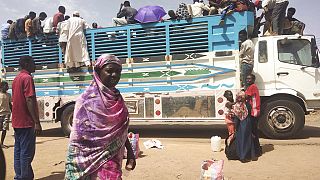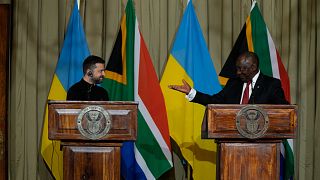The Morning Call
Among the over 700 journalists accredited to cover South Africa’s 2019 National Elections, there was a young, passionate and innovative team that set out to cover the country’s sixth democratic nations using popular social networks like Whatsapp, Instagram and YouTube.
Dubbed the The Sizwe Mpofu-Walsh Xperience or simply #SMWX, the team produces a live-stream show on WhatsApp that focuses on the intersection of politics and popular culture, seeking to connect with young people in a way that mainstream media have reportedly failed to do.
We spoke to the host of the show, Sizwe Mpofu-Walsh, a political activist, author and rapper, to take us through the highlights and milestones achieved by this unique approach to covering elections.
What does #SMWX hope to achieve?
The next five years look like disrupting the South African media space, bringing young people into the center of the conversation and really challenging an old model which has old elites, the same old voices on the same old platforms, saying the same old things. We want to completely bypass the infrastructure that has in our view biased South African politics away from the issues that affect young people in our country, and use Whatsapp as a way of virally spreading and informing a new generation of young people.
How successful has the channel been?
The channel has been going for two months, and at the beginning of this process two months ago, as we looked towards the South African elections, our big hope was that we could get a network of 5,500 people onto our Whatsapp channel that we could send instant messages with updates from a youth perspective on South African politics, and within the first four hours, we had nearly reached that objective. And right now as it stands, we have over 12,500 people on our channel.
How did #SMWX stand out in an election where technology was often used to drive fake news and disinformation?
Look, I think that disinformation is a really widespread phenomenon. But there are also incredible ways that you can use technology to inform. And, we can’t sit back and pretend that we should just let these platforms and these technologies into the hands of the worst, while people who are actually trying to inform don’t use them. I think the only we can really start fighting the battle of disinformation is using the very platforms where disinformation happens and seizing back ground to use these platforms for information and for empowerment.





![Africanews celebrates fifth anniversary [Night Shift]](https://static.euronews.com/articles/stories/05/57/72/74/320x180_cmsv2_6b1e7837-a917-526b-b3b4-4582a3f8bcac-5577274.jpg)
![Africanews celebrates fifth anniversary [Morning Call]](https://static.euronews.com/articles/stories/05/57/72/70/320x180_cmsv2_a6c857d4-80a3-510a-88e6-f060ea8d9ee9-5577270.jpg)






Go to video
Tanzania bans agricultural imports from South Africa and Malawi
Go to video
South Africa's tax row heads to court as implementation date nears
Go to video
South Africa appoints Mcebisi Jonas as special US envoy in bid to ease tensions
Go to video
South Africa: inquest into death of Nobel Peace Prize laureate Chief Albert Luthuli re-opened
Go to video
10.3 Million tons of food wasted in South Africa as chefs push for sustainability
Go to video
South Africans protest gender violence after child rape allegation